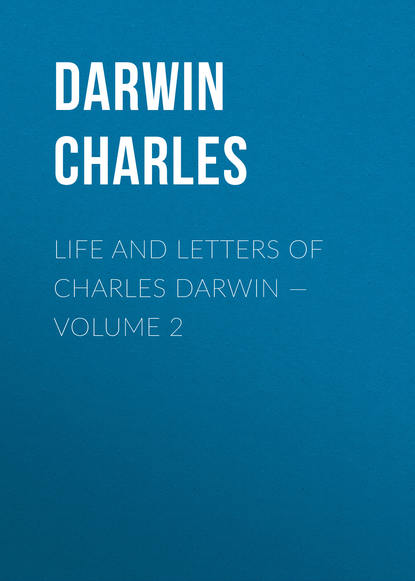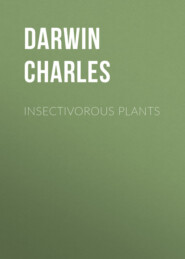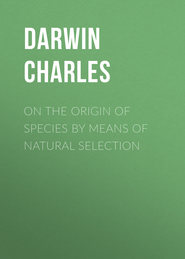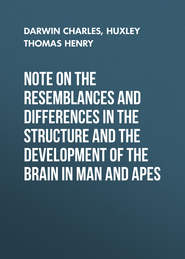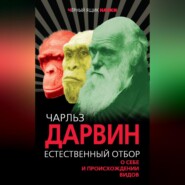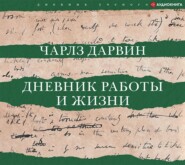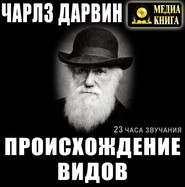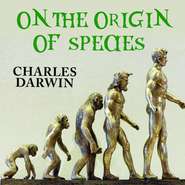По всем вопросам обращайтесь на: info@litportal.ru
(©) 2003-2024.
✖
Life and Letters of Charles Darwin — Volume 2
Настройки чтения
Размер шрифта
Высота строк
Поля
My dear Carpenter,
I must thank you for your letter on my own account, and if I know myself, still more warmly for the subject's sake. As you seem to have understood my last chapter without reading the previous chapters, you must have maturely and most profoundly self-thought out the subject; for I have found the most extraordinary difficulty in making even able men understand at what I was driving. There will be strong opposition to my views. If I am in the main right (of course including partial errors unseen by me), the admission in my views will depend far more on men, like yourself, with well-established reputations, than on my own writings. Therefore, on the supposition that when you have read my volume you think the view in the main true, I thank and honour you for being willing to run the chance of unpopularity by advocating the view. I know not in the least whether any one will review me in any of the Reviews. I do not see how an author could enquire or interfere; but if you are willing to review me anywhere, I am sure from the admiration which I have long felt and expressed for your 'Comparative Physiology,' that your review will be excellently done, and will do good service in the cause for which I think I am not selfishly deeply interested. I am feeling very unwell to-day, and this note is badly, perhaps hardly intelligibly, expressed; but you must excuse me, for I could not let a post pass, without thanking you for your note. You will have a tough job even to shake in the slightest degree Sir H. Holland. I do not think (privately I say it) that the great man has knowledge enough to enter on the subject. Pray believe me with sincerity, Yours truly obliged,
C. DARWIN.
P.S. — As you are not a practical geologist, let me add that Lyell thinks the chapter on the Imperfection of the Geological Record NOT exaggerated.
CHARLES DARWIN TO W.B. CARPENTER. Ilkley, Yorkshire, November 19th [1859].
My dear Carpenter,
I beg pardon for troubling you again. If, after reading my book, you are able to come to a conclusion in any degree definite, will you think me very unreasonable in asking you to let me hear from you. I do not ask for a long discussion, but merely for a brief idea of your general impression. From your widely extended knowledge, habit of investigating the truth, and abilities, I should value your opinion in the very highest rank. Though I, of course, believe in the truth of my own doctrine, I suspect that no belief is vivid until shared by others. As yet I know only one believer, but I look at him as of the greatest authority, viz., Hooker. When I think of the many cases of men who have studied one subject for years, and have persuaded themselves of the truth of the foolishest doctrines, I feel sometimes a little frightened, whether I may not be one of these mon-maniacs.
Again pray excuse this, I fear, unreasonable request. A short note would suffice, and I could bear a hostile verdict, and shall have to bear many a one.
Yours very sincerely, C. DARWIN.
CHARLES DARWIN TO J.D. HOOKER. Ilkley, Yorkshire, Sunday [November 1859].
My dear Hooker,
I have just read a review on my book in the "Athenaeum" (November 19, 1859.), and it excites my curiosity much who is the author. If you should hear who writes in the "Athenaeum" I wish you would tell me. It seems to me well done, but the reviewer gives no new objections, and, being hostile, passes over every single argument in favour of the doctrine... I fear from the tone of the review, that I have written in a conceited and cocksure style (The Reviewer speaks of the author's "evident self-satisfaction," and of his disposing of all difficulties "more or less confidently."), which shames me a little. There is another review of which I should like to know the author, viz., of H.C. Watson in the "Gardener's Chronicle". Some of the remarks are like yours, and he does deserve punishment; but surely the review is too severe. Don't you think so?
I hope you got the three copies for Foreign Botanists in time for your parcel, and your own copy. I have heard from Carpenter, who, I think, is likely to be a convert. Also from Quatrefages, who is inclined to go a long way with us. He says that he exhibited in his lecture a diagram closely like mine!
I shall stay here one fortnight more, and then go to Down, staying on the road at Shrewsbury a week. I have been very unfortunate: out of seven weeks I have been confined for five to the house. This has been bad for me, as I have not been able to help thinking to a foolish extent about my book. If some four or five GOOD men came round nearly to our view, I shall not fear ultimate success. I long to learn what Huxley thinks. Is your introduction (Introduction to the 'Flora of Australia.') published? I suppose that you will sell it separately. Please answer this, for I want an extra copy to send away to Wallace. I am very bothersome, farewell.
Yours affectionately, C. DARWIN.
I was very glad to see the Royal Medal for Mr. Bentham.
CHARLES DARWIN TO J.D. HOOKER. Down, December 21st, 1859.
My dear Hooker,
Pray give my thanks to Mrs. Hooker for her extremely kind note, which has pleased me much. We are very sorry she cannot come here, but shall be delighted to see you and W. (our boys will be at home) here in the 2nd week of January, or any other time. I shall much enjoy discussing any points in my book with you...
I hate to hear you abuse your own work. I, on the contrary, so sincerely value all that you have written. It is an old and firm conviction of mine, that the Naturalists who accumulate facts and make many partial generalisations are the REAL benefactors of science. Those who merely accumulate facts I cannot very much respect.
I had hoped to have come up for the Club to-morrow, but very much doubt whether I shall be able. Ilkley seems to have done me no essential good. I attended the Bench on Monday, and was detained in adjudicating some troublesome cases 1 1/2 hours longer than usual, and came home utterly knocked up, and cannot rally. I am not worth an old button... Many thanks for your pleasant note.
Ever yours, C. DARWIN.
P.S. — I feel confident that for the future progress of the subject of the origin and manner of formation of species, the assent and arguments and facts of working naturalists, like yourself, are far more important than my own book; so for God's sake do not abuse your Introduction.
H.C. WATSON TO CHARLES DARWIN. Thames Ditton, November 21st [1859].
My dear Sir,
Once commenced to read the 'Origin,' I could not rest till I had galloped through the whole. I shall now begin to re-read it more deliberately. Meantime I am tempted to write you the first impressions, not doubting that they will, in the main, be the permanent impressions: —
1st. Your leading idea will assuredly become recognised as an established truth in science, i.e. "Natural Selection." It has the characteristics of all great natural truths, clarifying what was obscure, simplifying what was intricate, adding greatly to previous knowledge. You are the greatest revolutionist in natural history of this century, if not of all centuries.
2nd. You will perhaps need, in some degree, to limit or modify, possibly in some degree also to extend, your present applications of the principle of natural selection. Without going to matters of more detail, it strikes me that there is one considerable primary inconsistency, by one failure in the analogy between varieties and species; another by a sort of barrier assumed for nature on insufficient grounds and arising from "divergence." These may, however, be faults in my own mind, attributable to yet incomplete perception of your views. And I had better not trouble you about them before again reading the volume.
3rd. Now these novel views are brought fairly before the scientific public, it seems truly remarkable how so many of them could have failed to see their right road sooner. How could Sir C. Lyell, for instance, for thirty years read, write, and think, on the subject of species AND THEIR SUCCESSION, and yet constantly look down the wrong road!
A quarter of a century ago, you and I must have been in something like the same state of mind on the main question, but you were able to see and work out the quo modo of the succession, the all-important thing, while I failed to grasp it. I send by this post a little controversial pamphlet of old date — Combe and Scott. If you will take the trouble to glance at the passages scored on the margin, you will see that, a quarter of a century ago, I was also one of the few who then doubted the absolute distinctness of species, and special creations of them. Yet I, like the rest, failed to detect the quo modo which was reserved for your penetration to DISCOVER, and your discernment to APPLY.
You answered my query about the hiatus between Satyrus and Homo as was expected. The obvious explanation really never occurred to me till some months after I had read the papers in the 'Linnean Proceedings.' The first species of Fere-homo ("Almost-man.") would soon make direct and exterminating war upon his Infra-homo cousins. The gap would thus be made, and then go on increasing, into the present enormous and still widening hiatus. But how greatly this, with your chronology of animal life, will shock the ideas of many men!
Very sincerely, HEWETT C. WATSON.
J.D. HOOKER TO CHARLES DARWIN. Athenaeum, Monday [November 21st, 1859].
My dear Darwin,
I am a sinner not to have written you ere this, if only to thank you for your glorious book — what a mass of close reasoning on curious facts and fresh phenomena — it is capitally written, and will be very successful. I say this on the strength of two or three plunges into as many chapters, for I have not yet attempted to read it. Lyell, with whom we are staying, is perfectly enchanted, and is absolutely gloating over it. I must accept your compliment to me, and acknowledgment of supposed assistance from me, as the warm tribute of affection from an honest (though deluded) man, and furthermore accept it as very pleasing to my vanity; but, my dear fellow, neither my name nor my judgment nor my assistance deserved any such compliments, and if I am dishonest enough to be pleased with what I don't deserve, it must just pass. How different the BOOK reads from the MS. I see I shall have much to talk over with you. Those lazy printers have not finished my luckless Essay; which, beside your book, will look like a ragged handkerchief beside a Royal Standard...
All well, ever yours affectionately, JOS. D. HOOKER.
CHARLES DARWIN TO J.D. HOOKER. Ilkley, Yorkshire [November 1859].
My dear Hooker,
I cannot help it, I must thank you for your affectionate and most kind note. My head will be turned. By Jove, I must try and get a bit modest. I was a little chagrined by the review. (This refers to the review in the "Athenaeum", November 19, 1859, where the reviewer, after touching on the theological aspects of the book, leaves the author to "the mercies of the Divinity Hall, the College, the Lecture Room, and the Museum.") I hope it was NOT — . As advocate, he might think himself justified in giving the argument only on one side. But the manner in which he drags in immortality, and sets the priests at me, and leaves me to their mercies, is base. He would, on no account, burn me, but he will get the wood ready, and tell the black beasts how to catch me... It would be unspeakably grand if Huxley were to lecture on the subject, but I can see this is a mere chance; Faraday might think it too unorthodox.
... I had a letter from [Huxley] with such tremendous praise of my book, that modesty (as I am trying to cultivate that difficult herb) prevents me sending it to you, which I should have liked to have done, as he is very modest about himself.
You have cockered me up to that extent, that I now feel I can face a score of savage reviewers. I suppose you are still with the Lyells. Give my kindest remembrance to them. I triumph to hear that he continues to approve.
Believe me, your would-be modest friend, C.D.
CHARLES DARWIN TO C. LYELL. Ilkley Wells, Yorkshire, November 23 [1859].
My dear Lyell,
You seemed to have worked admirably on the species question; there could not have been a better plan than reading up on the opposite side. I rejoice profoundly that you intend admitting the doctrine of modification in your new edition (It appears from Sir Charles Lyell's published letters that he intended to admit the doctrine of evolution in a new edition of the 'Manual,' but this was not published till 1865. He was, however, at work on the 'Antiquity of Man' in 1860, and had already determined to discuss the 'Origin' at the end of the book.); nothing, I am convinced, could be more important for its success. I honour you most sincerely. To have maintained in the position of a master, one side of a question for thirty years, and then deliberately give it up, is a fact to which I much doubt whether the records of science offer a parallel. For myself, also, I rejoice profoundly; for, thinking of so many cases of men pursuing an illusion for years, often and often a cold shudder has run through me, and I have asked myself whether I may not have devoted my life to a phantasy. Now I look at it as morally impossible that investigators of truth, like you and Hooker, can be wholly wrong, and therefore I rest in peace. Thank you for criticisms, which, if there be a second edition, I will attend to. I have been thinking that if I am much execrated as an atheist, etc., whether the admission of the doctrine of natural selection could injure your works; but I hope and think not, for as far as I can remember, the virulence of bigotry is expended on the first offender, and those who adopt his views are only pitied as deluded, by the wise and cheerful bigots.
I cannot help thinking that you overrate the importance of the multiple origin of dogs. The only difference is, that in the case of single origins, all difference of the races has originated since man domesticated the species. In the case of multiple origins part of the difference was produced under natural conditions. I should INFINITELY prefer the theory of single origin in all cases, if facts would permit its reception. But there seems to me some a priori improbability (seeing how fond savages are of taming animals), that throughout all times, and throughout all the world, that man should have domesticated one single species alone, of the widely distributed genus Canis. Besides this, the close resemblance of at least three kinds of American domestic dogs to wild species still inhabiting the countries where they are now domesticated, seem to almost compel admission that more than one wild Canis has been domesticated by man.
I thank you cordially for all the generous zeal and interest you have shown about my book, and I remain, my dear Lyell,
Your affectionate friend and disciple, CHARLES DARWIN.
Sir J. Herschel, to whom I sent a copy, is going to read my book. He says he leans to the side opposed to me. If you should meet him after he has read me, pray find out what he thinks, for, of course, he will not write; and I should excessively like to hear whether I produce any effect on such a mind.
T.H. HUXLEY TO CHARLES DARWIN. Jermyn Street W., November 23rd, 1859.





